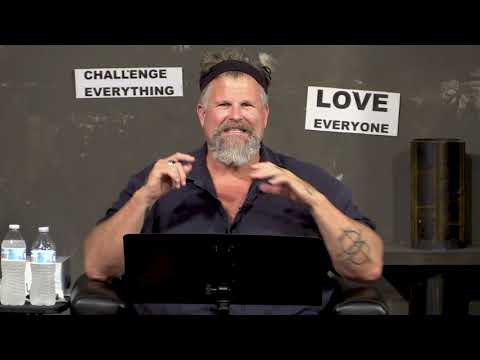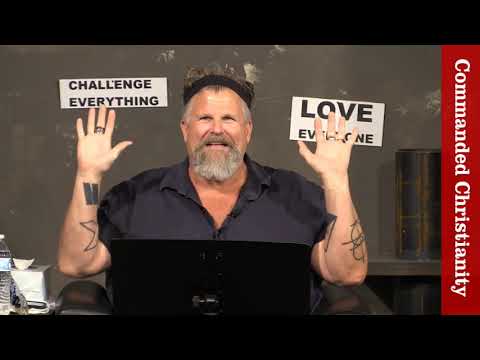
And The Weiner Is…
The teaching stresses testing beliefs for genuine good, guided by truth, honesty, and love, while critiquing tradition over authenticity, promoting openness and agape love.

The teaching stresses testing beliefs for genuine good, guided by truth, honesty, and love, while critiquing tradition over authenticity, promoting openness and agape love.

Shawn McCraney critiques "Commanded Christianity," questioning the imposition of divine laws on all life aspects by Reformed preachers, advocating for a personal, love-based faith.

Believers should seek spiritual growth through scripture, not just experiences. True maturity comes from understanding God's Word, as shown in Luke 24 and Yeshua's teachings.

Shawn McCraney highlights Jesus' acceptance and rejection, the translation journey of His name, the lifting of the vail through Christ, and the importance of cultural context.

Shawn McCraney explains Jesus' temptations were contextually relevant to His time, not modern specifics, yet He empathizes with today's challenges, offering compassion and redemption.

Shawn McCraney advocates for using "Yeshua" over "Jesus," discarding traditional religious views, focusing on spiritual growth, love, and authenticity in Christian faith.

Script currently unavailable.

Shawn McCraney teaches nurturing a direct relationship with God through Christ, focusing on spiritual growth, love, and kindness over religious rules, emphasizing inner transformation.

Shawn McCraney teaches living with Jesus now, not waiting for afterlife. CAMPUS church promotes faith with freedom, peace, love, no dogma, but faces declining attendance.

Shawn McCraney's teaching stresses genuine Christianity over hypocrisy, urging believers to avoid superficial faith, be authentic, and either fervently devoted or honestly indifferent.

Shawn McCraney emphasizes discerning literal vs. figurative Bible interpretations, unity over dogma, faith in Jesus, love, and skepticism of scripture-justified practices like polygamy.

Shawn McCraney challenges traditional Christian roles, especially "pastor," advocating for personal faith exploration and rejecting hierarchical titles. He critiques Mormonism's racial biases and urges a return to authentic depictions of Jesus, promoting inclusivity and unity.

Shawn's teaching advises against literal Bible interpretation, promoting reason and spiritual guidance for understanding. Emphasizes context, love, and avoiding harmful zealotry.

Shawn McCraney contrasts Mormonism's focus on works with Christianity's faith-based approach, emphasizing humility, forgiveness, and gratitude as key Christian virtues.

Believers are justified and sanctified, new creations in Christ, saved by faith. Spiritual growth leads to rewards, not increased salvation. Suffering servant prophecy.

Shawn McCraney teaches that suffering evidences God's goodness, allowing free will. He contrasts "Contrite Right" humility with "Dark Left" pride, and views the Trinity as one essence.

Shawn McCraney contrasts Ayn Rand's self-interest with Christian selflessness, emphasizing spiritual growth through a direct relationship with God, leading to true joy and purpose.

Shawn McCraney stresses evaluating Christian doctrine for purity and love, aligning with Jesus' teachings. Emphasizes Jesus as "God with us" and personal connection with God.

Shawn McCraney emphasizes spiritual growth, eternal rewards, and living by God's will over earthly pleasures. Believers are promised glorified bodies in New Jerusalem.

Shawn McCraney promotes embracing flaws using FLAWED (Faith, Love, Art, Work, Education, Dimension), encourages artistic expression, warns against legalism, and stresses separating faith from politics.

Shawn McCraney teaches that Christians should reject self-serving desires, embrace God's love, and grow spiritually by following the Spirit, facing challenges with humility.

Shawn McCraney teaches focusing on Jesus, transformed hearts, and agape love over politics. He contrasts Christian archetypes, advocating empathy and understanding for all.

Shawn McCraney discusses Christians as "flawed" by worldly standards, emphasizing faith, love, and creativity. He encourages embracing flaws, prioritizing God, and spiritual growth.

Shawn McCraney highlights the gap between Christian values and actions, urging compassion beyond personal circles, addressing biases, and fostering empathy for marginalized groups.

Shawn McCraney's teaching highlights the duality of light (God/goodness) and darkness (evil/secrecy), urging believers to focus on God's will, embody light, and reject darkness.

Shawn McCraney prioritizes spiritual allegiance over political activism, emphasizes love and peace, discusses pacifism, and encourages deep biblical exploration.

Satan, once good, became evil by opposing God. Christ's victory nullifies Satan's role as accuser. Evil stems from human desires, not Satan, post-70 AD.

Shawn McCraney teaches that beliefs shape identity and behavior, urging love over doctrinal disputes. He critiques rigid doctrines, promotes inclusivity, and emphasizes love and authenticity in faith.

Questioning faith, subjective relationship with God, beyond doctrines, God's universal love, faith in Jesus, spiritual journey, community strength, Holy Spirit renewal.

Shawn McCraney distinguishes between the Holy Spirit and Spirit of Christ, critiques organized religion, emphasizes agape love, and advocates for personal faith over dogma.